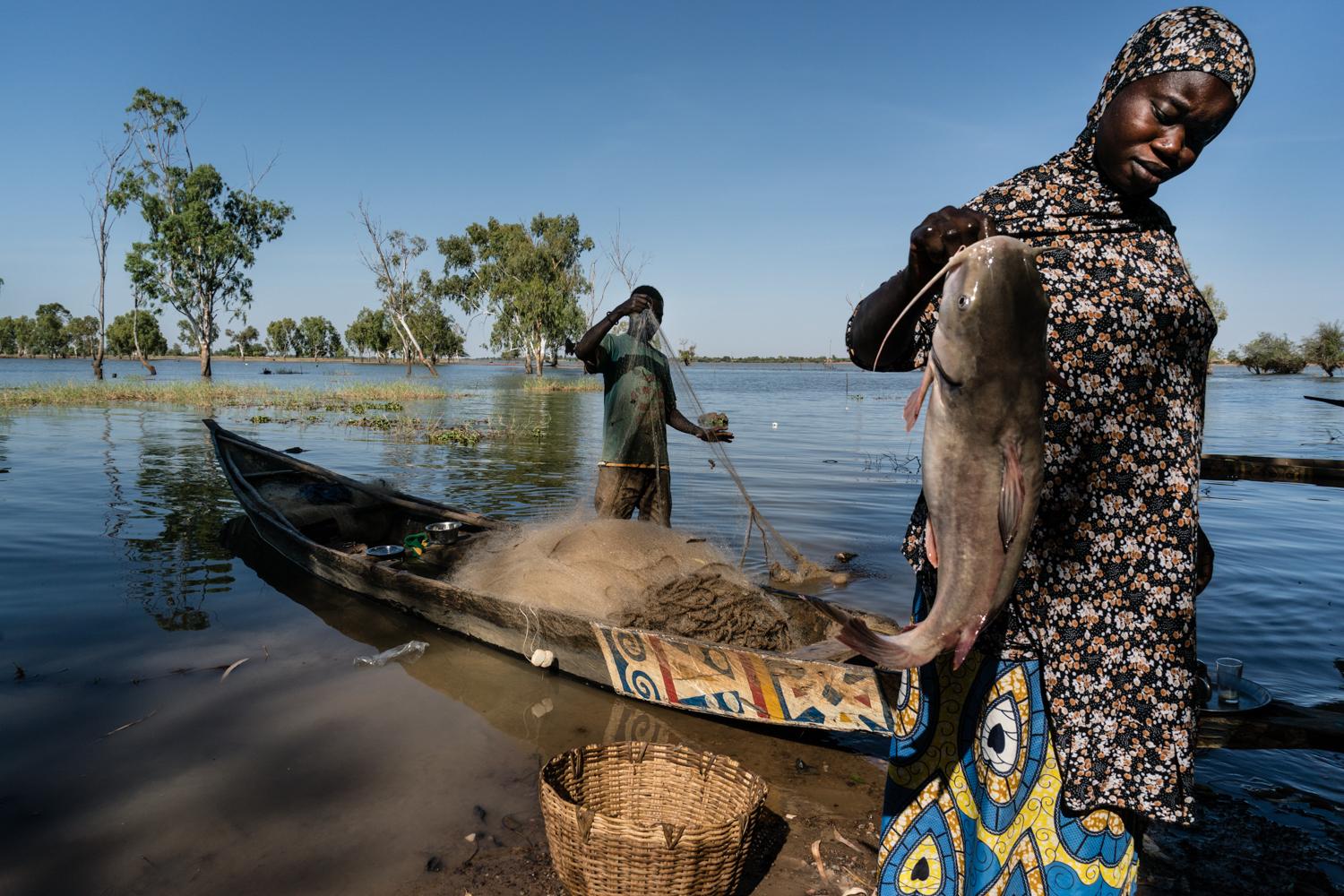Rechercher
Affichage de 2055 à 2070 sur 3122 actualités
-
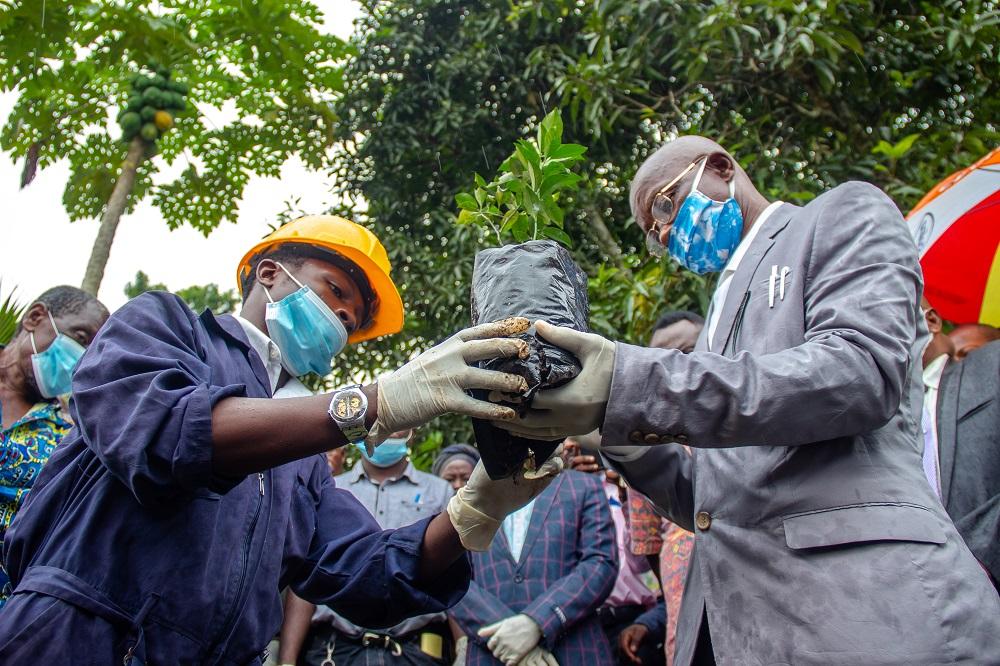
RDC: Célébration de la journée nationale de l'arbre à la Tshopo!
Fabrice KANKU MABIKA | 08/12/2020
Le 5 décembre de chaque année, la République Démocratique du Congo célèbre une journée nationale dédiée à l'Arbre.Notons que pour cette année 2020 c'est la 25ème édition qui se célébrait sous le thème : « l'arbre, un capital important pour le développement socioéconomique et environnemental ». Et pour joindre l’utile à l’agréable, Enabel à travers son projet EDUT procède à une série d’activités de sensibilisation dans les écoles techniques agricoles dont la première étape a été réalisée à l’Institut Technique Agricole Simisimi. Au cours de cette activité, un rappel des bienfaits de l’arbre a été épinglé à savoir : Au niveau écologique dans son rôle de générateur de vies ; Au niveau de la biodiversité dans son rôle de maintien de la santé du milieu naturel ; Sur la lutte contre l’érosion à travers la stabilisation et la régulation de l’hydrologie du sol ; Sur l’amélioration de la qualité de l’eau dans son rôle d’absorption des eaux de la surface ;Et, sur son rôle de monument d’architecture à travers l’apport de réconfort dans le paysage. Cette année, il a été rappelé le rôle économique de l’arbre à travers essentiellement la production fruitière. Les vergers, les plantations d’arbres fruitiers sont une source des revenus importante et sont générateurs d’emplois.A cet effet, cinq espèces ont été privilégiées : Avocatier, Manguier, Safoutier, Citrus et Pommier ont été transplantés. Autorités de tout bord et élèves, tout le monde s’est prêté à cet exercice important.Ainsi, dans une Province comme la Tshopo, sujette au déboisement massif, aucun effort, aucune initiative d’éducation environnementale ne peut être ménagée. Nous voulons que la vie soit belle ? Plantons des arbres ! Fabrice KANKU MABIKA
-
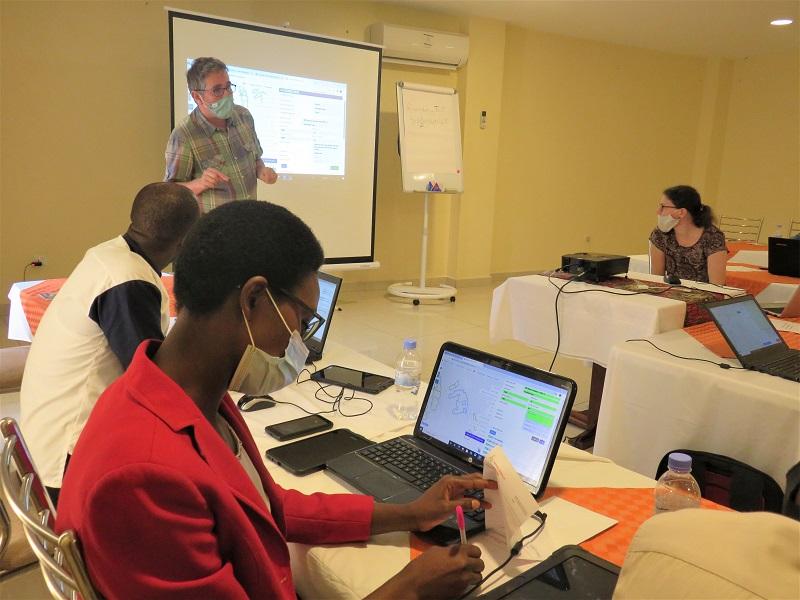
Enabel trains Forestry sector staff on a software for a better management of Rwanda’s forests
Denise NSANGA | 07/12/2020
A one-week training on a user-friendly and customized District Forest Management Plan (DFMP) database and the Forest Monitoring and Evaluation Systems (FMES) software was conducted from 30 November to 04 December 2020 for Rwanda Forestry Authority (RFA) staff as well as District Forest and Natural Resources Officers (DFOs) from Enabel’s Forestry Management and Biomass Energy support programme (FMBE). This training aimed to ensure harmonization and simplification of the tools used in monitoring and evaluation of the forestry sector. The 17 trained staff will use the sofware for the design, review and monitoring of public and private forests management according to the requirements of the National Forestry Policy and forest Sector Strategic Plan. The software will allow: (1) to demarcate on field all public and private forests using GPS/Tablet, and register them with all relevant information (land conflict, current forest status and management), (2) to design/update/monitor the management plan of these registered forests.
-
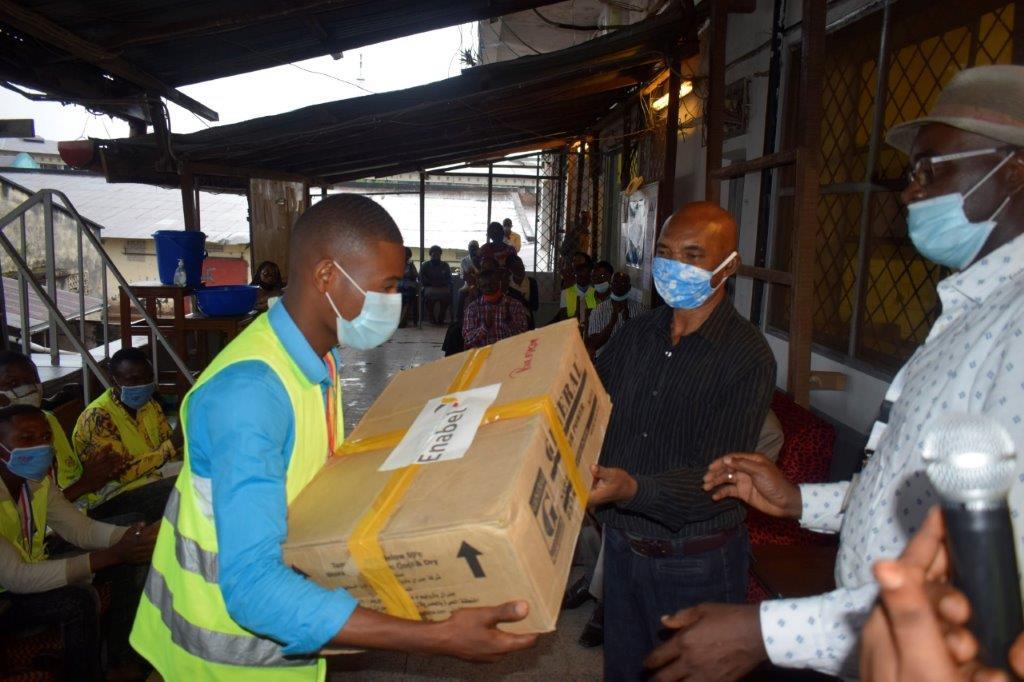
RDC: Concours des métiers de Lubumbashi : Enabel honore ses lauréats
Aimé GIRUKWIGOMBA | 07/12/2020
Dans l’après-midi du vendredi 20 novembre 2020, le bureau de la Coordination d’Enabel Tshopo a servi de cadre à une réception organisée en l’honneur de 4 jeunes ayant pris part au concours des métiers qui s’est tenu du 5 au 7 novembre à Lubumbashi. Sur les 4 compétiteurs de la Tshopo, 3 ont raflé respectivement une médaille d'or et d' argent pour la maçonnerie, et une de bronze pour la menuiserie. Le concours a connu la participation de 98 candidats pour 16 métiers. Les 4 lauréats de la Tshopo sont issus des écoles appuyées par Enabel dans le cadre du programme d’appui à l’enseignement technique et à la formation professionnelle (EDUT). Raison pour laquelle Enabel Tshopo a tenu à les honorer. Comme cadeaux, ils ont reçu chacun du matériel nécessaire à l’exercice de leurs métiers respectifs. Outre les agents Enabel, la réception a été honorée de la présence du Sous-Divisionnaire adjoint de l’Enseignement primaire, secondaire et technique et de quelques chefs d’établissements. Félicien Kabasele Dishi
-
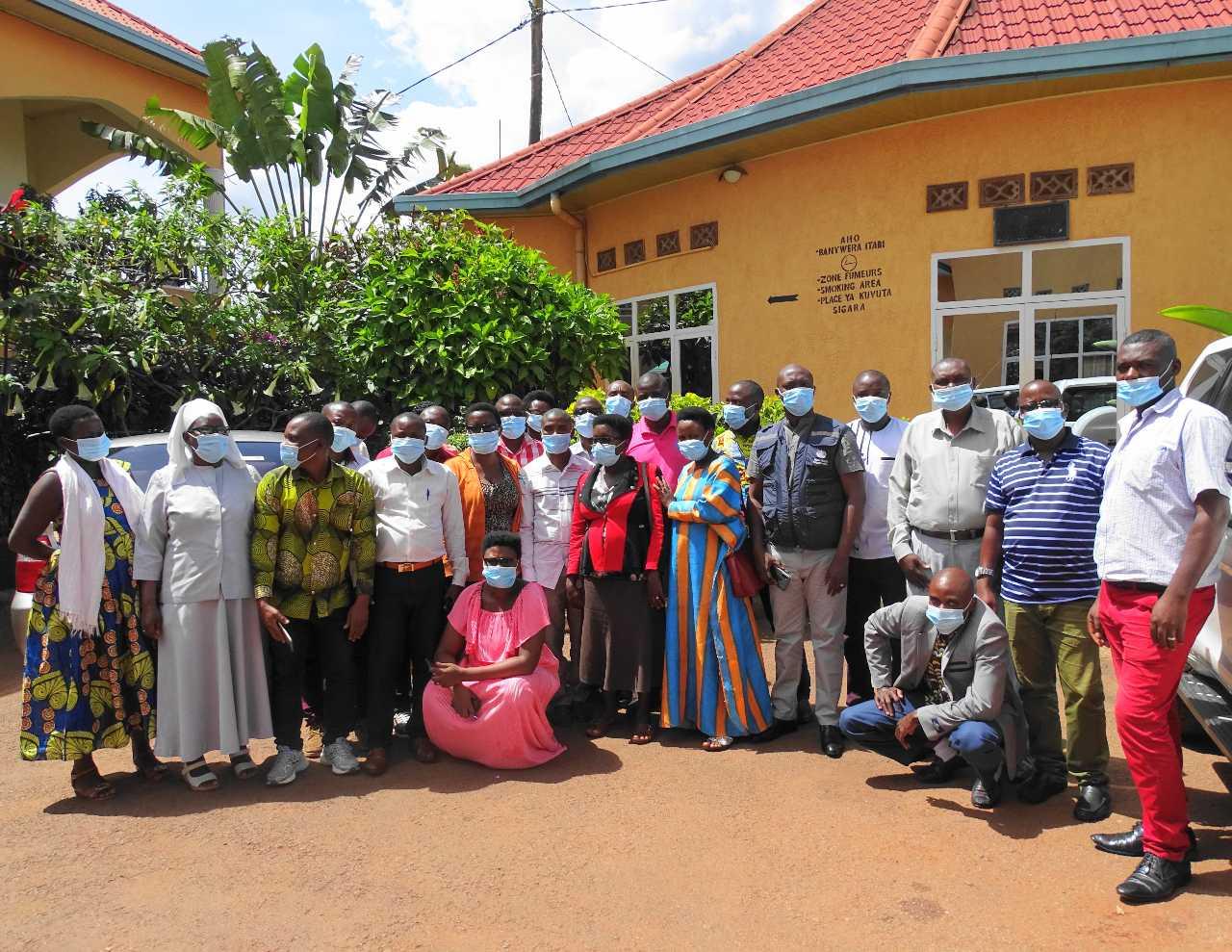
La lutte contre les violences sexuelles et basées sur le genre, un enjeu central au développement du système de santé burundais
Carla MORVAN | 07/12/2020
ContextualisationLes violences sexuelles et basées sur le genre sont un enjeu mondial du vingt-et-unième siècle.Au Burundi, elles restent une réalité et une préoccupation de santé publique.Plus d’une femme sur deux a subi des actes de violence que ce soit de nature émotionnelle, physique ou sexuelle, commis par un partenaire intime*. Dans le cadre du projet Twiteho Amagara, le consortium Enabel, représenté par l’OMS a, conjointement avec le Ministère de la Santé Publique et de la Lutte contre le Sida (MSPLS), organisé une formation des prestataires de formations sanitaires (FOSA) de la province de Rumonge sur la prise en charge intégrée des victimes de violences sexuelles et basées sur le genre (VSBG). Cette formation s’est tenue la semaine du 2 novembre 2020 en province de Ngozi. Les 24 participant-e-s venant des districts sanitaires de Rumonge et Bugarama ont donc suivi durant toute la semaine des enseignements divers et variés sur cette thématique, allant de l’identification clinique d’une victime de VSBG en passant par les techniques de prise en charge psychosociale ou encore l’orientation efficace vers d’autres services pour les victimes (orientation judiciaire notamment). La notion de sexe et de genreAfin de comprendre les causes et les conséquences des violences sexuelles et basées sur le genre, il faut d’abord être en mesure d’identifier la différence entre les notions de sexe et de genre. Le sexe fait référence aux caractéristiques biologiques, physiologiques et génétiques des femmes et des hommes. Le genre, quant à lui, fait référence aux attentes de la société vis-à-vis de la façon dont les femmes et les hommes sont censé-e-s se comporter. Il n’est pas fixe et évolue au fil du temps. De par les siècles, fruit de la société patriarcale dans laquelle les civilisations et générations ont de tout temps évolué, il a généralement été associé aux femmes le fait de savoir cuisiner, de s’occuper des enfants, de rester cantonnée, en somme, à la sphère privée. Un certain nombre de caractéristiques est associé à la femme dans ce modèle, à savoir la douceur, l’obéissance, la beauté, etc. A l’inverse, l’homme est associé à la sphère publique, il se doit de gagner de l’argent, d’être responsable de sa famille et d’être autonome. Les caractéristiques qui lui sont associées sont la force, le courage, la rudesse, etc. Ces stéréotypes de genre sont intégrés dans les sociétés et les cultures, ce qui fait qu’un long processus est nécessaire afin d’aboutir à une prise de conscience sur la gravité de la reproduction de ceux-ci. La formation des prestataires de soins de santéPour illustrer ceci, au second jour de la formation, après avoir déjà abordé diverses thématiques liées au VSBG comme les notions de sexe et de genre, les stéréotypes associés au genre, les formes, les causes et les conséquences de la VSBG, les formateurs et formatrices ont décidé de mettre en pratique les connaissances enseignées. Pour cela, l’étude de cas suivante a été présentée : Alain et Mariette sont mariés. La famille d’Alain vient chez lui pour dîner. Il est très anxieux car il veut qu’ils passent tous un bon moment et il veut leur montrer que sa femme est une bonne cuisinière. Lorsqu’il rentre chez lui ce soir-là, rien n’a été préparé. Mariette ne se sent pas bien, et elle n’a pas encore commencé à préparer le dîner. Alain est très fâché. Il ne veut pas que sa famille croit qu’il est incapable de contrôler sa femme. Ils commencent à se disputer et à se crier dessus. La dispute s’envenime, et Alain la frappe. La première question posée aux participant-e-s au sujet de cette étude de cas était de savoir s’il s’agissait bien d’une forme de VSBG et si oui, de laquelle. Les participant-e-s ont unanimement répondu que oui, il s’agissait en effet d’une violence physique basée sur le genre. Cependant, à la seconde question qui était de savoir s’ils et elles pensaient qu’Alain avait eu raison de frapper Mariette, la réponse a également été presque unanimement affirmative. Certain-e-s participant-e-s ont motivé leur réponse en expliquant qu’il lui avait été demandé de faire ce repas, que c’était son rôle d’épouse que de répondre aux exigences de son mari, et que par conséquent, son mari était dans son droit de la punir pour cette erreur. Cette étude de cas met en évidence les causes profondes des VSBG, en effet, il est socialement accepté dans notre société qu’un homme puisse se mettre en colère et puisse l’exprimer. Il est également courant d’utiliser la violence comme forme de punition à un comportement qui ne répond pas à la norme en vigueur. Ces causes profondes entrainent de lourdes conséquences qui impactent l’état de santé des femmes à plusieurs niveaux. Il va de soi que leur santé physique est mise à mal lorsque des VSBG sont perpétrées à leur encontre, mais au-delà des conséquences directes d’une violence physique, de nombreuses autres pathologies peuvent en découler, à savoir notamment des maladies cardiovasculaires, des troubles du système nerveux central, des maladies articulaires, des troubles gastro-intestinaux, des douleurs chroniques, etc. La santé reproductive des femmes et filles victimes de VSBG est aussi impactée, des troubles gynécologiques peuvent apparaitre ainsi que des dysfonctionnements sexuels, le développement de maladies ou infections sexuellement transmissible ou encore le VIH/SIDA. La santé psychologique est un élément non négligeable à prendre en considération dans le cas de VSBG, les victimes sont plus sujettes à l’anxiété, la dépression, les troubles de stress post-traumatique, le détachement émotionnel, les troubles du sommeil, etc. Mais la VSBG va encore plus loin dans le sens ou elle n’affecte pas que la santé de la personne, mais également sa vie économique et sociale avec un risque d’accès plus restreint aux services, une stigmatisation par la communauté, un isolement par rapport aux réseaux de soutien, un maintien ou une chute dans un cercle vicieux de pauvreté. Une prise de conscience de la gravité des VSBG est donc primordiale afin de concourir au bon développement du pays et les professionnel-le-s de santé doivent être les premier-e-s à être sensibilisés et à sensibiliser. Lors de la formation, nous avons pu récolter plusieurs témoignages à ce sujet. Par exemple, Alice*, médecin nous explique : « j’ai déjà eu affaire à des cas de VSBG, mais je ne savais pas que cela en était. J’ai réalisé qu’il y avait beaucoup de cas de VSBG qui étaient passés inaperçus à mes yeux car je n’avais pas suffisamment de connaissances ». Jacques*, infirmier a, quant à lui, été témoin, dans son entourage de VSBG, il dit : « j’ai assimilé beaucoup de nouvelles connaissances à propos des VSBG. J’ai par exemple pu comprendre que l’une de mes voisines avait été victime de VSBG. Je comprends à présent que les cas de VSBG sont hébergés partout, chez nos voisins, dans nos familles, etc. et nous ne le savons pas ». Ces témoignages confirment et rappellent que les VSBG sont omniprésentes dans notre société et qu’il est indispensable d’agir rapidement. Un manque cruel de connaissances par rapport à ces questions s’est fait ressentir au début de la formation. Seules 5 personnes sur les 24 présentes au total ont eu une note supérieure à la moyenne lors du pré-test. Nombreux sont les témoignages récoltés qui expliquent, comme Rodrigue*, infirmier que : « grâce à la formation, beaucoup de choses vont changer. Parfois, nous faisons des choses au sein de la famille ou de la communauté qui sont des VSBG mais nous ne le savons pas. Nous devons sensibiliser notre entourage afin que le nombre de cas baisse. Je m’engage personnellement à sensibiliser ma famille et mes connaissances afin d’éradiquer ces cas malheureux ».Les professionnel-le-s de santé, facteurs de changement L’espoir est bel et bien présent pour que les choses changent mais un grand travail reste à accomplir. Selon Alice*, il est important de : « former davantage de prestataires, ce n’est pas suffisant de former un-e prestataire par structure ». Les professionnel-le-s de santé sont au carrefour d’un changement possible concernant les VSBG ; prestataires de soins, ils sont en contact direct avec les victimes mais en tant que membre à part entière de leur communauté ; ils et elles sont aussi écouté-e-s et respecté-e-s et sont susceptible de faire passer des messages qui auront des impacts dans le futur. Jocelyne*, infirmière nous a fait part de ses motivations pour la suite : « cette formation va influer mon comportement, je vais faire tout mon possible pour sensibiliser mon entourage afin qu’il y ait des changements de comportements. Je n’ai pas peur d’en parler avec mes proches et de les sensibiliser, mais j’ai conscience du fait que c’est un processus qui prendra du temps ». Le témoignage d’Alice* sur cette question était également intéressant : « Cette formation va beaucoup m’aider, sur le plan de mon conjoint, de mes enfants et de mon entourage, mais aussi de mes patients. C’est vrai que la question des VSBG est tabou mais je vais profiter de cette formation pour sensibiliser en douceur, sans être brutale, étape par étape. Je pense que cela portera ses fruits. J’ai même déjà commencé à en parler à ma famille cette semaine ». * EDSB 2016-2017
-
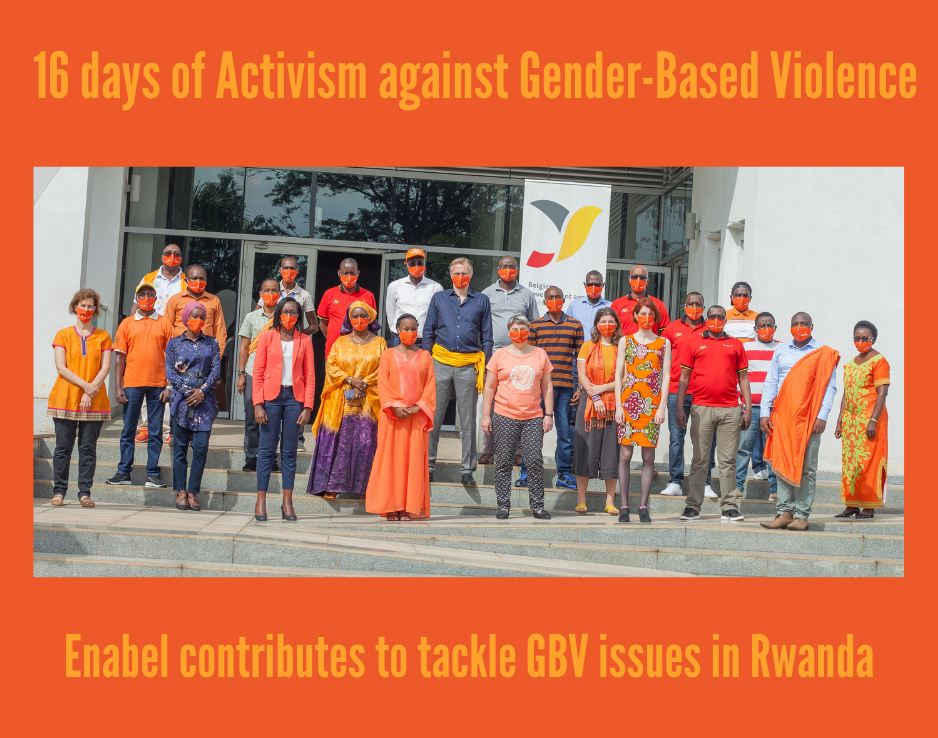
Enabel in Rwanda takes part to the 16 Days of Activism to end Gender Based Violence
Denise NSANGA | 04/12/2020
Enabel is actively working to contribute to end Gender-Based Violence in seven districts of Rwanda through "Barame" health project focusing on maternal, neonatal, child, adolescent, sexual and reproductive health. The objective is to offer quality services and management to victims of GBV at the right place and at the right time. To achieve this, the project is training medical staff, renovating "Isange" One Stop Centers (IOSC) and providing relevant medical equipment. So far, 43 staff of IOSCs and 81 other staff from hospitals including medical doctors, nurses, midwives, social workers and psychologists have been trained on gender-based violence case management. In addition, 6 IOSCs have been renovated and medical equipment (such as ultrasounds) has been provided. Moreover, to offer services closer to the population, the project works on the extension of GBV services at health center level, as recommended by the 4th Health Sector Strategic Plan. Up to now, 235 staff of health centers have been trained on GBV case management, including community and environmental health officers, nurses, social workers and mental health professional.
-
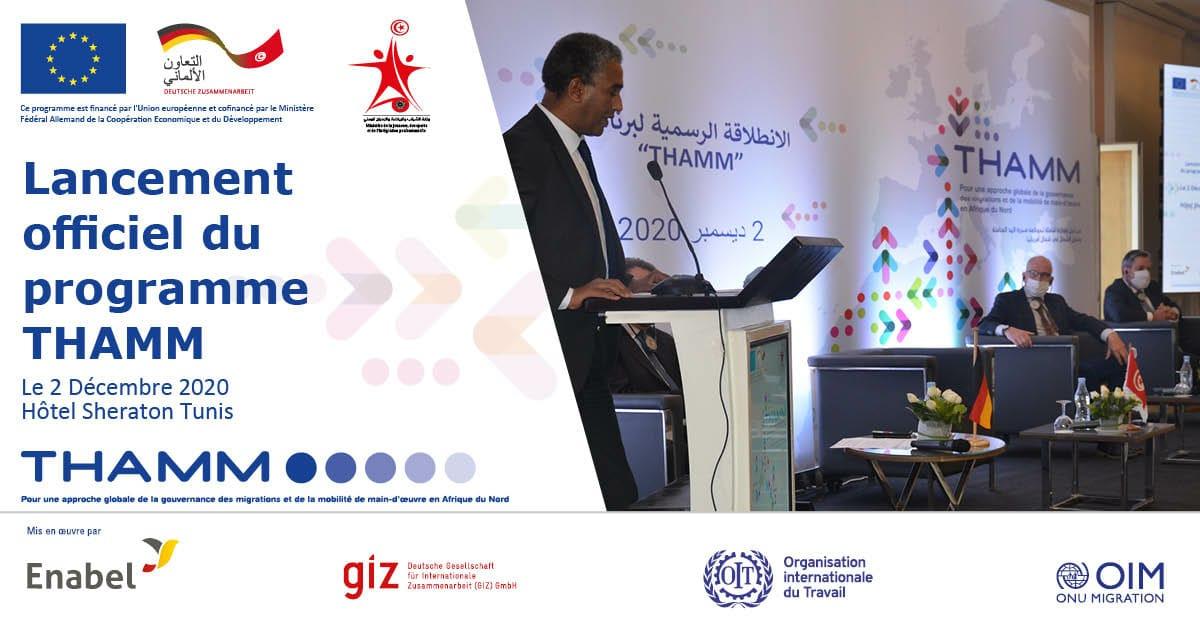
En Tunisie, lancement du programme THAMM favorisant les possibilités de migration et de mobilité
Meriem HILALI | 04/12/2020
Le mercredi 2 décembre a eu lieu le lancement officiel du programme pour une approche globale de la gouvernance des migrations et de la mobilité de main-d’œuvre en Afrique du Nord en Tunisie. Le programme est financé par l’Union européenne et co-financé par le Ministère Fédéral Allemand de la Coopération Économique et du Développement (BMZ) et mis en œuvre par Le Ministère de la Jeunesse, des Sports et de l'Intégration Professionnelle en partenariat avec les agences d’exécution : l’Organisation internationale du Travail (OIT), l’Organisation internationale pour les Migrations (OIM), la Deutsche Gesellschaft für Internationale Zusammenarbeit (GIZ) et Enabel. Il est conçu comme un programme sous-régional mis en œuvre en Tunisie, au Maroc et en Égypte. L'intervention d'Enabel concerne le Maroc et la Tunisie. Enabel propose un schéma de mobilité innovant qui se base sur le partenariat, le développement des compétences et l'accompagnement des talents pour accéder à de réelles opportunités d'emploi aussi bien au niveau des pays partenaires que des pays d'accueil.
-
Appui à la filière halieutique au Mali: résultats prometteurs pour réduire l’insécurité alimentaire
Nènè TRAORE | 02/12/2020
Le gouvernement malien, notamment dans le cadre de l'alliance globale pour la résilience face aux crises au Sahel et en Afrique de l'Ouest (AGIR), a décidé de réduire structurellement et de manière durable la vulnérabilité alimentaire et nutritionnelle de la population malienne. Le projet d’appui à la filière halieutique (PAFHa+) est cofinancé par l’Union européenne et l’Agence Française de Développement qui en ont confié l’exécution à Enabel.Avec un budget total de 15,5 millions d’euros, le PAFHa+ intervient dans les régions de Mopti et de Ségou, avec des activités d’appui aux acteurs de la filière halieutique et de renforcement institutionnel au bénéfice notamment de la Direction Nationale de la Pêche. Avec comme objectif global de contribuer à la réduction de l’insécurité alimentaire et nutritionnelle au Mali, des résultats tangibles sont à constater.En effet, au cours de cette année, les grands enseignements à retenir en termes de résultats sont les suivants : Le PAFHa+ a permis de faire passer de 7% à 77% le niveau d’accès des professionnels de la pêche et de l’aquaculture des régions de Ségou et Mopti aux services de la Direction Nationale de la Pêche et de ses démembrements sur le terrain. Dans un contexte souvent caractérisé par une absence des services de l’Etat, notamment en région de Mopti, c’est un résultat qui a également des impacts en termes de valorisation du rôle de l’Etat auprès des populations de pêcheurs de la zone, face à la montée de l’influence des groupes radicaux. Le PAFHa+ a permis de modifier sensiblement les comportements des transformatrices de poisson concernant le fumage, dont la pratique traditionnelle pose de véritables problèmes de santé publiques (utilisation de pesticides notamment). Ainsi, le taux de bonnes pratiques est passé de 11% à 89% pour les plus de 800 transformatrices des campements de pêche accompagnées par le projet. Cela a eu pour conséquence de diminuer le niveau de pertes post-captures de 7% à 3% (potentiellement 16 tonnes par an de pertes de poisson évitées) et d’augmenter de 1,5 à 3,8 mois la durée moyenne de conservation de ces produits. Le PAFHa+ a permis la production en 2020 de 40 tonnes de poisson frais en pisciculture communautaire au niveau de 59 villages, avec un rendement de 626 kg/ha en moyenne, permettant ainsi une contribution significative à l’amélioration de la sécurité alimentaire dans ces villages. La plus-value de l’activité représente 160% du montant investi par le projet. Les ventes d’une partie de la production alimentent des caisses villageoises, permettant de financer des actions sociales dans les villages. D’autres résultats ont été atteints en termes de réalisation d’infrastructures, d’adoption de bonnes pratiques d’hygiène dans la manipulation du poisson frais, d’accompagnement de l’organisation de mises en défens et de pêches collectives, de sensibilisation des pêcheurs aux pratiques de pêche durable. Par contre, certains sujets demandent une attention particulière comme les niveaux de rentabilité de la pisciculture privée, ou les niveaux de services rendus par les Organisations des Professionnels de la Pêche(OPP) à leurs membres. Aussi, en soutien aux efforts du gouvernement dans la prévention et la gestion des conflits intra et intercommunautaires, le PAFHa+ en partenariat avec la Direction Nationale de la Pêche, a démarré la mise en œuvre d’un processus d’appui à la cogestion des pêches afin d’arriver à une exploitation inclusive, apaisée et durable des ressources halieutiques au Mali. Il s’agit notamment d’accompagner la mise en place des conseils de pêche et d’aquaculture sur le terrain, au niveau communal, ainsi que le processus d’élaboration de conventions locales de pêche. ·
-
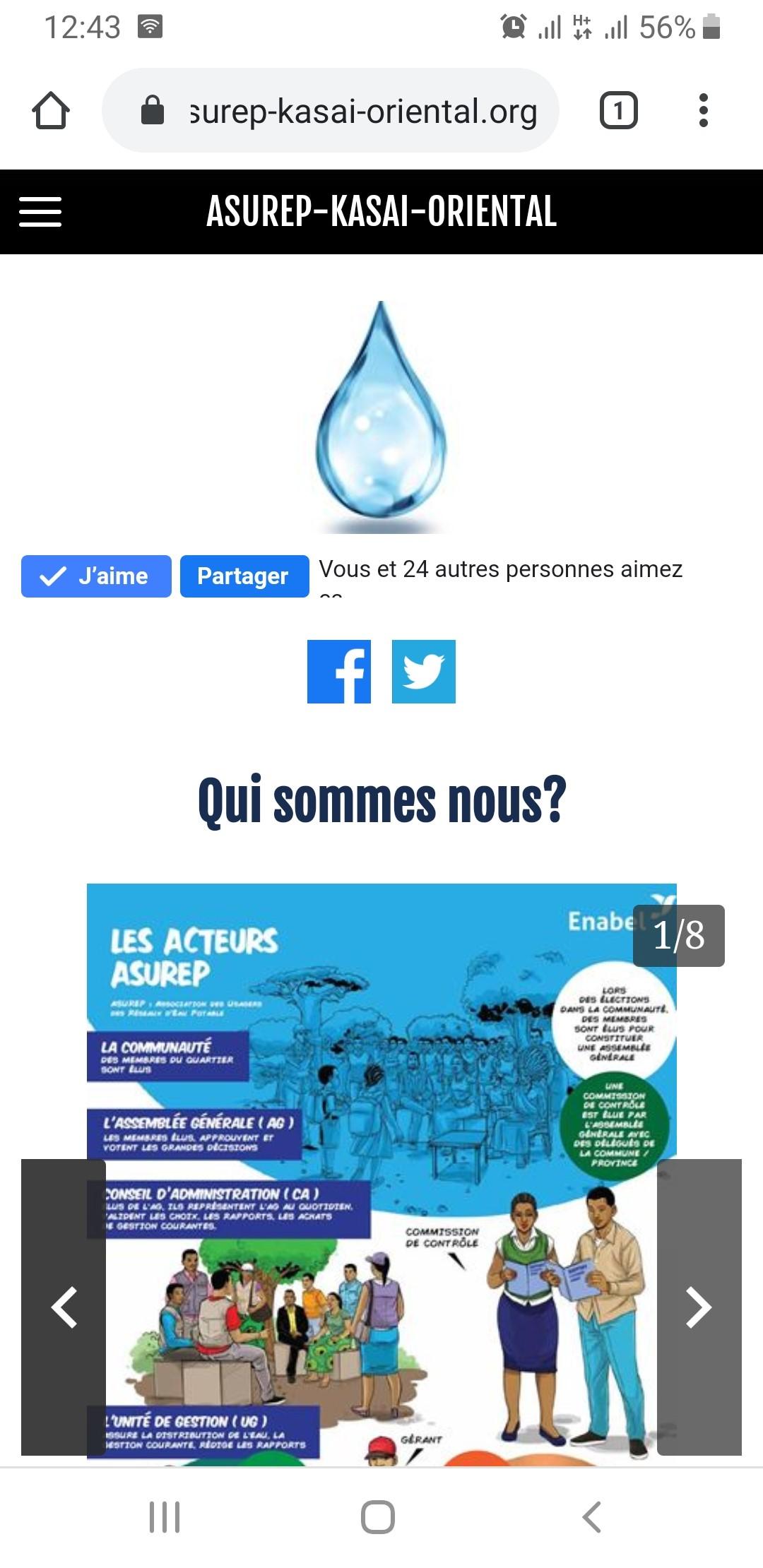
Professionnalisation des exploitations de réseaux d'eau du Kasaï Oriental - RDC
Grâce MALI FAIDA | 02/12/2020
Enabel appuie depuis deux ans les exploitants des réseaux d’eau en RD Congo vers le chemin de la professionnalisation, de la transparence et de la redevabilité, vis-à-vis des utilisateurs des réseaux d’eau mais aussi des autorités qui leur ont délégué le service public de l’eau (conformément à la loi sur l’eau de 2015 et à leur contrat de délégation). En RD Congo, les exploitants des réseaux d’eau dans les zones péri-urbaines sont connus sous le nom d’ASUREP : Associations des Usagers des Réseaux d’Eau Potable. Ces associations sont délégataires du service public de l’eau, pour assurer la distribution d’eau potable de qualité à plus de 330 000 personnes, rien que dans la ville de Mbuji Mayi dans la Province du Kasaï Oriental. Comme pour tous les autres exploitants des réseaux d’eau, l’eau doit être traitée (chloration), la qualité doit être contrôlée (contrôles microbiologiques), les index des stations de pompage et des bornes fontaines doivent être relevés quotidiennement, les fuites doivent être décelées et réparées, … Et toutes ces opérations doivent être rapportées et accessibles.Des rapports d’exploitation et financiers sont produits mensuellement et doivent parvenir aux autorités. Bien souvent, ces rapports s’entassent sur des étagères et tombent dans l’oubli. Comment rendre ces données plus accessibles, plus transparentes aux différents services de l’Etat et aux consommateurs des réseaux d’eau ? Le programme Eau exécuté par Enabel a proposé un accompagnement technique des ASUREP pour l’élaboration d’un site web de A à Z. Il aurait été tentant de déléguer l’exécution d’un site web à une société tierce ou un consultant externe, cependant, afin de garantir que l’outil sera mis à jour de manière régulière, le programme a préféré impliquer les ASUREP dès le départ à la conception du site web. Tous les rapports et données de chaque réseau d’eau sont aujourd’hui accessibles.C’est aussi le cas des supports de sensibilisation. Avec les services existants actuellement sur le marché, la mise en œuvre d’un site web est nettement facilitée. Il n’est pas nécessaire de savoir programmer en HTML et la création, réservation et paiement d’un nom de domaine, d’un espace de stockage et de plusieurs adresses email professionnelles ne nécessitent qu’une carte de crédit. Pour un budget de 650 USD tout à fait à portée des exploitant ASUREP, il est déjà possible de réserver un espace de stockage et d’accéder à un tableau de bord pour le design du site web, valable pendant 5 années. Les ASUREP ont d’abord commencé par visiter les site web des autres exploitants ou agences de l’eau, aussi bien en Afrique qu’en Europe pour trouver une source d’inspiration qui leur convenait. Il a suffi ensuite de créer l’arborescence des pages web en gardant à l’esprit que les cibles sont d’une part les utilisateurs (principalement la société civile et les associations de consommateurs) et les autorités (communes, mairie, ministères décentralisés en charge de l’eau et gouvernorat). Visitez le site web: www.asurep-kasai-oriental.org
-
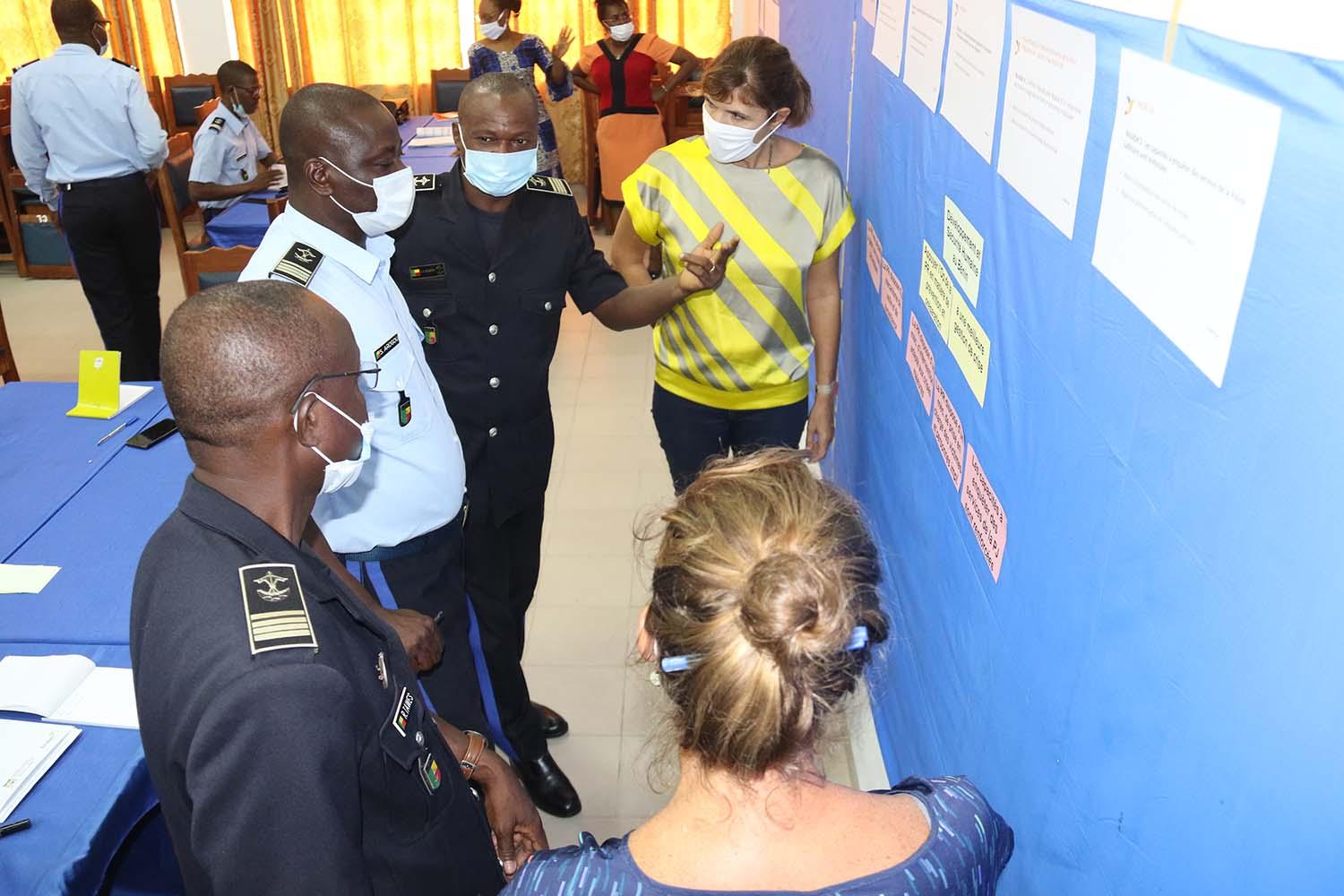
Opérationnalisation de la police républicaine béninoise: les bases revisitées
Reece-hermine ADANWENON | 27/11/2020
Du 25 au 27 novembre 2020, toutes les parties prenantes du nouveau programme d’appui à l’opérationnalisation de la police républicaine (PAOP) et son volet gestion de crise (PAOP-CRI) ont passé en revue la théorie de changement, la logique d’intervention et la matrice des risques qui seront la boussole du programme durant les 3 années de son exécution. Aux côtés de l’équipe d'Enabel au Bénin étaient réunis à l’INFOSEC de Cotonou, les représentants du Ministère de l’intérieur et de la sécurité publique, les cadres de la police républicaine, les membres de la société civile, de l’association nationale des communes du Bénin, des PTF (GiZ, Union Européenne, Ambabel). Initié par Enabel au Bénin pour accompagner le gouvernement dans la réforme du secteur de la sécurité, le programme d’appui à l’ppérationnalisation de la police républicaine et son volet de gestion de crise ambitionne d’aider la police à développer le concept de police communautaire au service des populations pour une société paisible et ouverte, pour des institutions efficaces et un accès de tous à la justice.
-

Lancement de la première école intensive sur le droit de l’asile et de la migration au Maroc
Meriem HILALI | 27/11/2020
Du 23 au 27 novembre 2020, à Oujda, Casablanca, Rabat et Tanger, Enabel et ses partenaires organisent la première école intensive sur le droit de l’asile et de la migration. Cet événement vient compléter les ateliers et séminaires thématiques organisés afin de renforcer les connaissances des étudiants impliqués dans les cliniques juridiques en matière de droit d’asile et de la migration. L’école est organisée dans le cadre de l’intervention Empowerment juridique des personnes migrantes (EJPM) financée par l'Union européenne et mise en œuvre par Enabel, en partenariat avec le Ministère de la justice et le Ministère délégué auprès du Ministère des Affaires étrangères, de la Coopération africaine et des Marocains résidant à l’étranger, chargé des Marocains résidant à l’étranger. Le projet « Empowerment juridique des personnes migrantes » apporte notamment un appui à quatre cliniques juridiques rattachées respectivement à l’Université Hassan II de Casablanca/ Aïn Chok, à l’Université Mohamed 1er d’Oujda, à l’Université Mohamed V de Rabat/ Agdal et à l’Université Abdelmalek Saâdi de Tanger. Ces cliniques juridiques sont des espaces dans lesquels des étudiants en droit travaillent sur des cas réels et des questions sociales, sous la supervision d’enseignants-chercheurs et/ou de professionnels du droit. Les quatre cliniques susmentionnées abordent, exclusivement ou en parallèle avec d’autres contentieux, les divers problèmes juridiques auxquels sont confrontées les personnes migrantes dans leurs régions respectives.La cérémonie de lancement officiel est disponible via ce lien : https://youtu.be/nZ3729LWhDo
-
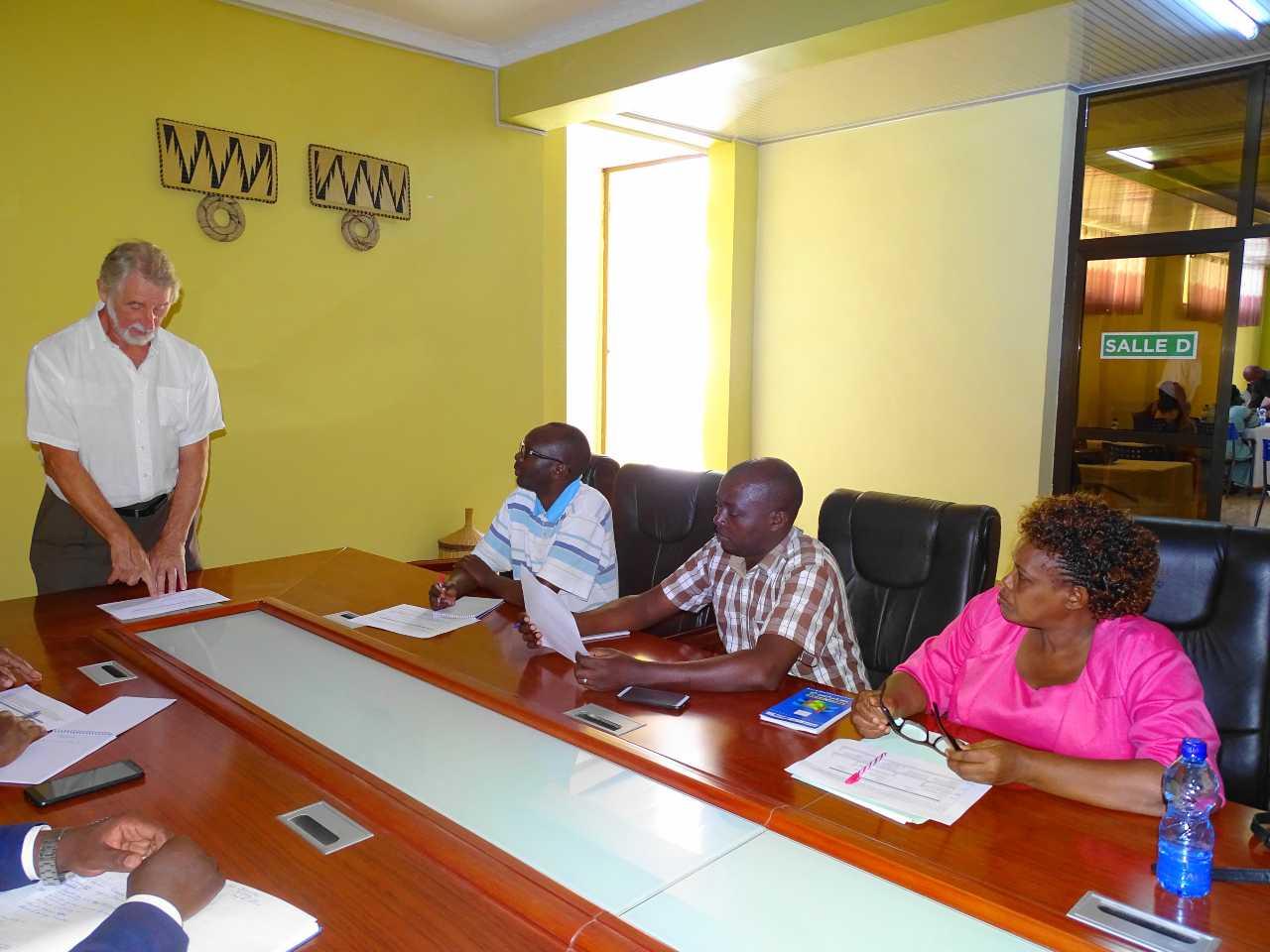
Burundi: Entretien avec le Pr. Jef Van Den Ende sur la digitalisation de la stratégie plainte traitement
Carla MORVAN | 23/11/2020
Dans un but d’amélioration de la qualité des soins de santé au Burundi, le Ministère de la Santé Publique et de la Lutte contre le Sida (MSPLS) a décidé de mettre en place des outils support au diagnostic et au traitement pour les personnels des niveaux décentralisés. La « Stratégie Plainte-Traitement » (SPT) est un de ces outils qui aide l’infirmier à partir des plaintes du malade à cibler le traitement. L’introduction de ces outils a été faite dans les années 2010. Ils fonctionnent sur la base d’algorithmes. L’objectif des SPT est de réduire les situations d’incertitude face à la prise de décision médicale en rationalisant la prise en charge des soucis de santé de manière efficace et efficiente, en augmentant les taux de guérison, en diminuant les coûts des soins et en accélérant les références justifiées. Jusqu’à présent, les SPT se présentaient sous la forme de guides papiers, très volumineux et très encombrants. Dans le cadre du projet Résilience (Twiteho Amagara, financé par l’Union européenne) le consortium Enabel, représenté par Enabel, a décidé de mettre en place, dans ses cinq provinces d’intervention, un projet pilote de digitalisation de ces SPT. Cela signifie que les algorithmes utilisés au niveau des guides papiers ont été retranscrits en code afin de créer une version digitalisée et une application mobile beaucoup plus faciles à manœuvrer. Afin de mieux comprendre les enjeux et les objectifs de cette digitalisation pour le projet Twiteho Amagara, nous avons interrogé le professeur Jef Van den Ende, médecin interniste spécialiste en épidémiologie clinique, en intelligence artificielle ainsi qu’en développement de logiciels de formation.Il est à présent professeur invité au sein de plusieurs universités à travers le monde. Il possède également de nombreuses expériences dans d’autres pays de la sous-région (il a notamment exercé durant six années à l’Hôpital de Dungu au Haut Zaïre et durant trois années au Centre Hospitalier Universitaire de Kigali au Rwanda). Selon vous Jef, quel est l’objectif de la digitalisation des SPT, en comparaison à la version papier ? « L’objectif principal de la digitalisation est d’obliger le prestataire à suivre méticuleusement un chemin diagnostique qui mène à une décision bien fondée. Dans la version papier il n’était pas clair qu’il fallait avant tout – avec quelques questions bien ciblées – exclure les maladies graves et traitables avant d’aller plus loin. Personne que j’ai interrogé n’avait compris ce pas indispensable. Dans un algorithme informatisé on ne peut progresser avant d’avoir répondu à ces questions fondamentales ». Est-ce que cette version digitalisée est bien acceptée par les prestataires et les patients ? « Le problème que posent les SPT « papier » est qu’elles ne sont pas suffisamment utilisées par les prestataires. La raison principale à cela est la confiance. En effet, si un patient aperçoit un prestataire qui consulte des documents papiers pour arriver à une solution thérapeutique, il va penser que ce dernier est incompétent et donc perdra toute confiance en lui. Avec les tablettes digitales, le patient a la sensation que le prestataire ne fait que remplir le dossier médical, ce qui le rassure. De plus, la tablette en soi aurait un effet ‘magique’ : dans certains cas, le patient se sent guidé par une main presque surnaturelle. Du côté prestataire il y a une certaine réticence, parce qu’ils soulignent qu’il y a beaucoup trop d’issues « il faut référer le patient ». De plus, ils ont la sensation de ne plus être considérés comme des « médecins ». Mais en dépit de ces réserves, nous nous attendons quand même à ce qu’au moins la moitié des patients soient consultés à l’aide des SPT digitalisés après leur mise en place ». Quels est le rôle de votre mission ici ? « Mon rôle est de former les formateurs, à savoir les équipes cadres des districts sanitaires et du MSPLS qui eux-mêmes vont former leurs équipes à savoir les prestataires des centres de santé (CDS). Je souhaite également leur transmettre la logique derrière les SPT, mon objectif n’est pas seulement de leur enseigner à utiliser l’application, mais aussi à analyser la manière dont celle-ci a été construite. Les notions principales à comprendre sont celles des pouvoirs de confirmation et d’exclusion d’une réponse à une question. Par exemple, si nous voulons exclure une pathologie grave et traitable, il faudra un nœud avec un fort pouvoir d’exclusion, un symptôme quasi ‘nécessaire’. Il est également important de ne pas hésiter à référer : il s’agit d’un concept fondamental dans l’approche algorithmique des décisions médicales. Dans de nombreux cas, l’état du patient s’est spontanément amélioré lorsqu’il arrivait à l’hôpital, ou la situation a été estimée plus grave qu’elle ne l’était en réalité. Cependant, cela ne veut pas dire que la décision de référer, prise à la base d’un symptôme d’alarme, était erronée : elle était bien justifiée. Tant pour les formateurs que pour les prestataires, réaliser que si une référence peut s’avérer inutile en fin de compte, ne veut pas dire qu’elle n’était pas justifiée au départ. Il s’agit d’un aspect fondamental dans la logique de décision médicale, qui explique l’apparent excès de références dans le logiciel ». Quel(s) résultat(s) souhaitez-vous atteindre au travers de cette activité ? « Le principal résultat qui est attendu de cette formation est le développement de qualités de formateurs chez les participants. Outre la maîtrise du matériel et du logiciel, je souhaiterais que les personnes formées puissent reprendre les différentes techniques interactives d’andragogie et d’animation que je leur ai enseignées tout au long de la semaine. Ceci participe à leur autonomie ».
-
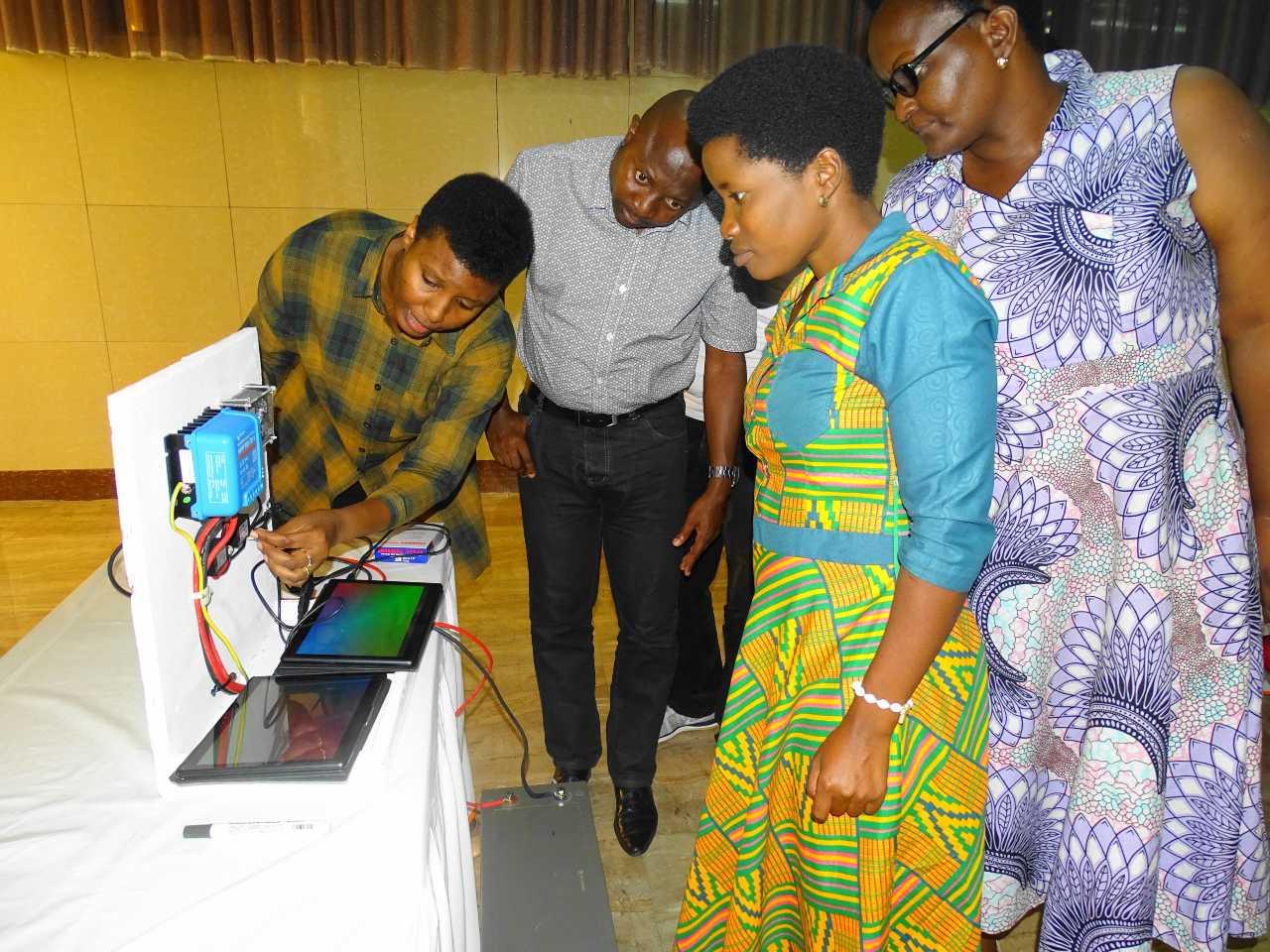
Au Burundi, la digitalisation du système de santé: des résultats plus que prometteurs!
Carla MORVAN | 23/11/2020
La digitalisation du système de santé au Burundi est primordiale pour la contribution à l’objectif d’accroissement de l’accessibilité à des services de santé de qualité pour la population.Les bénéfices de la digitalisation des structures sanitaires ne sont plus à démontrer à l’échelle mondiale : amélioration de la qualité des soins, gains de temps, mise en place de protocoles thérapeutiques standards, économies budgétaires, accessibilité à des données de qualité etc. La digitalisation représente un enjeu majeur du futur dans le monde médical des pays en développement. Dans le cadre du projet Twiteho Amagara, Enabel réalise cinq activités en lien avec la digitalisation du système de santé. La première concerne l’informatisation des processus gestionnaires du Centre National de Transfusion Sanguine (CNTS), la seconde vise l’informatisation des métiers de l’hôpital de district de Rwibaga ; la troisième l’informatisation des dossiers médicaux des patients des centres de santé (CDS) de Bujumbura. La quatrième consiste en la digitalisation de Stratégie Plainte Traitement (SPT) dans cinquante CDS de Bujumbura et Mairie. La SPT est un outil d’aide au diagnostic et au traitement à l’usage des infirmiers des CDS du Burundi.Enfin, la dernière de ces activités s’intéresse à la consolidation de ces innovations par une formation e-health en vue d’un certificat en informatique de santé appliqué. Une cinquantaine de personnes, comprenant du personnel de santé mais pas uniquement seront ainsi formés.De nombreux avantages sont à attendre de ces activités.Tout d’abord, une amélioration de la transparence et de la traçabilité des transactions. Ceci est lié au renforcement de l’égalité dans l’accès aux soins en raison de l’objectivation des critères et modalités de traitement mais également car le circuit du/de la patient.e aura été revu. La qualité de la prise en charge des patient.e.s va également croitre dans la mesure où la digitalisation oblige à plus de rigueur et à compléter davantage de renseignements requis sur les dossiers. De plus, la qualité des données récoltées en sera augmentée car l’informatique laisse moins de place à l’erreur humaine ou au double encodage. La digitalisation du système de santé permet aux formations sanitaires (FOSA) d’acquérir une meilleure gestion des ressources financières notamment grâce à un enregistrement des recettes facilité, à l’accélération du processus de recouvrement en cas de services à crédit mais également du fait d’une augmentation de la fréquentation enregistrée et d’une meilleure gestion des médicaments. Des impacts non négligeables sur l’environnement sont à prévoir dans la mesure où cette digitalisation permettra, d’une part, une diminution considérable de la quantité de supports papiers actuellement utilisée par les formations sanitaires et d’autres part, l’énergie consommée sera en grande partie issue de panneaux photovoltaïques. Enfin le personnel qui passe à l’utilisation des outils informatiques gagnent en estime de soi.
-
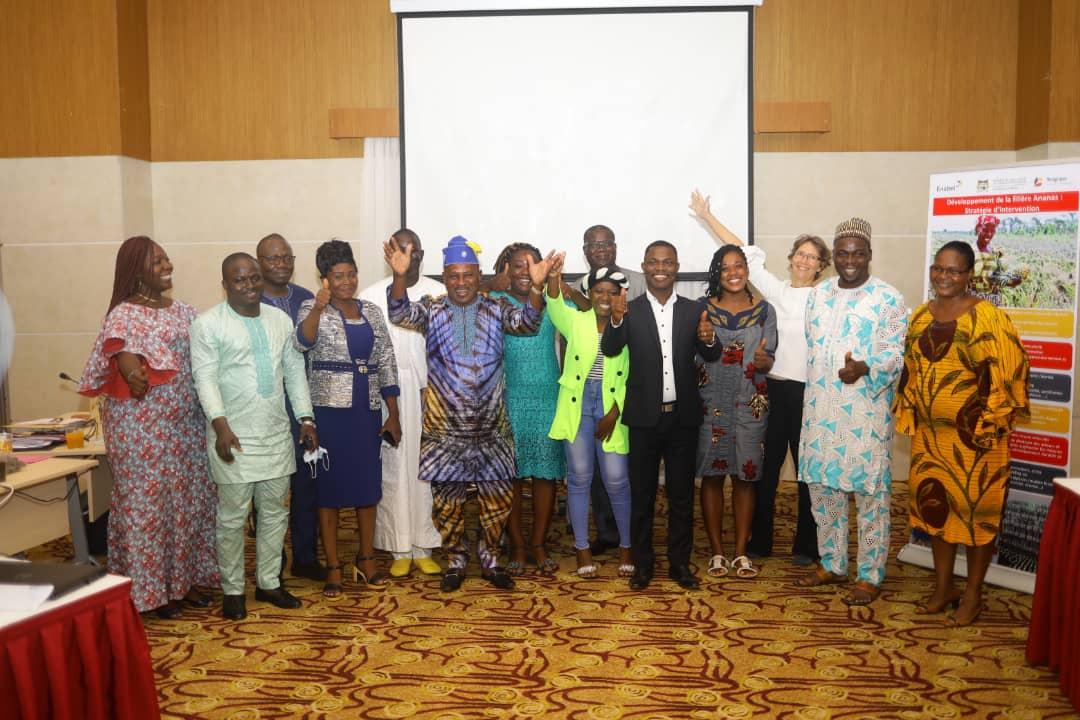
Concours d'innovations technologiques agricoles au Bénin
Reece-hermine ADANWENON | 20/11/2020
Initié par le Programme DEFIA au Bénin, le concours « Inno-Valorana » a connu son épilogue ce vendredi 20 novembre 2020 à Golden Tulip Hôtel. Sur 10 projets sélectionnés 5 idées d’innovation technologiques agricoles ont retenu l’attention du jury constitué à cet effet. - Production de champignons à base des déchets de transformation de l'ananas par GEANT & CO de Mme ADJANOHOUN Georgina ; - Valorisation des résidus de l'ananas à travers la production de fertilisants organiques de meilleure qualité pour une agriculture écologique et intensive dans les zones urbaines et péri urbaines du Bénin par BIO LIFE et présenté par Mme Jelila Seho BLALOGOE ; - Production et commercialisation des biscuits à base des drèches issues de la transformation de l'ananas pour faciliter et améliorer l'alimentation des enfants de l’entreprise Ets KIDEO de Mme KIKI Déo Gracias ; - Production de provende animale à base de résidus issus de la transformation d'ananas de Moustapha GAFAROU ; - Production de poudre d'ananas à partir de la pulpe et du cœur séché d'ananas proposée par Mme Laure Bonin Omoto BABA de GABS BENIN. Voilà les 5 idées d’innovations technologiques agricoles retenues par les membres du jury de sélection et d’attribution, composé du MAEP, de DEFIA, du FNDA, de l’ATDA7 et de la FENACOTAB. Ces lauréats bénéficieront d’un accompagnement technique et financier de DEFIA pour réaliser la mise en œuvre de leur projet et rendre la filière ananas plus performante au Bénin. Selon Mme Wilma Baas, intervention manager du programme DEFIA, ce concours a été lancé dans le but d’augmenter les revenus des promoteurs d’idées agricoles, de créer des emplois et d’améliorer le système macro-économique du Bénin à travers la diversification des produits de la filière ananas et une meilleure valorisation des résidus. A l’issu d’un premier appel à candidature, 45 dossiers de projets avaient été soumis par les entreprises. Un comité d’analyse composé de l’ATDA 7, l’AIAB et DEFIA ont visité tous les projets éligibles et ont présélectionné 10 dossiers d’innovation afin de retenir les meilleurs projets d’innovation. Mr Innocent TOGLA, Secrétaire Général Adjoint du Ministère de l’Agriculture de l’Elevage et de la Pêche (SGA-MAEP) procédant au lancement officiel de la sélection des meilleures innovations a rappelé que la recherche des idées nouvelles pour la valorisation des résidus issus de la transformation de l’ananas est une action qui va impacter considérablement la filière ananas sur plusieurs plans tels que environnemental (assainir le cadre de transformation de l’ananas), financier avec la création de nouvelles activités génératrices de revenus.
-
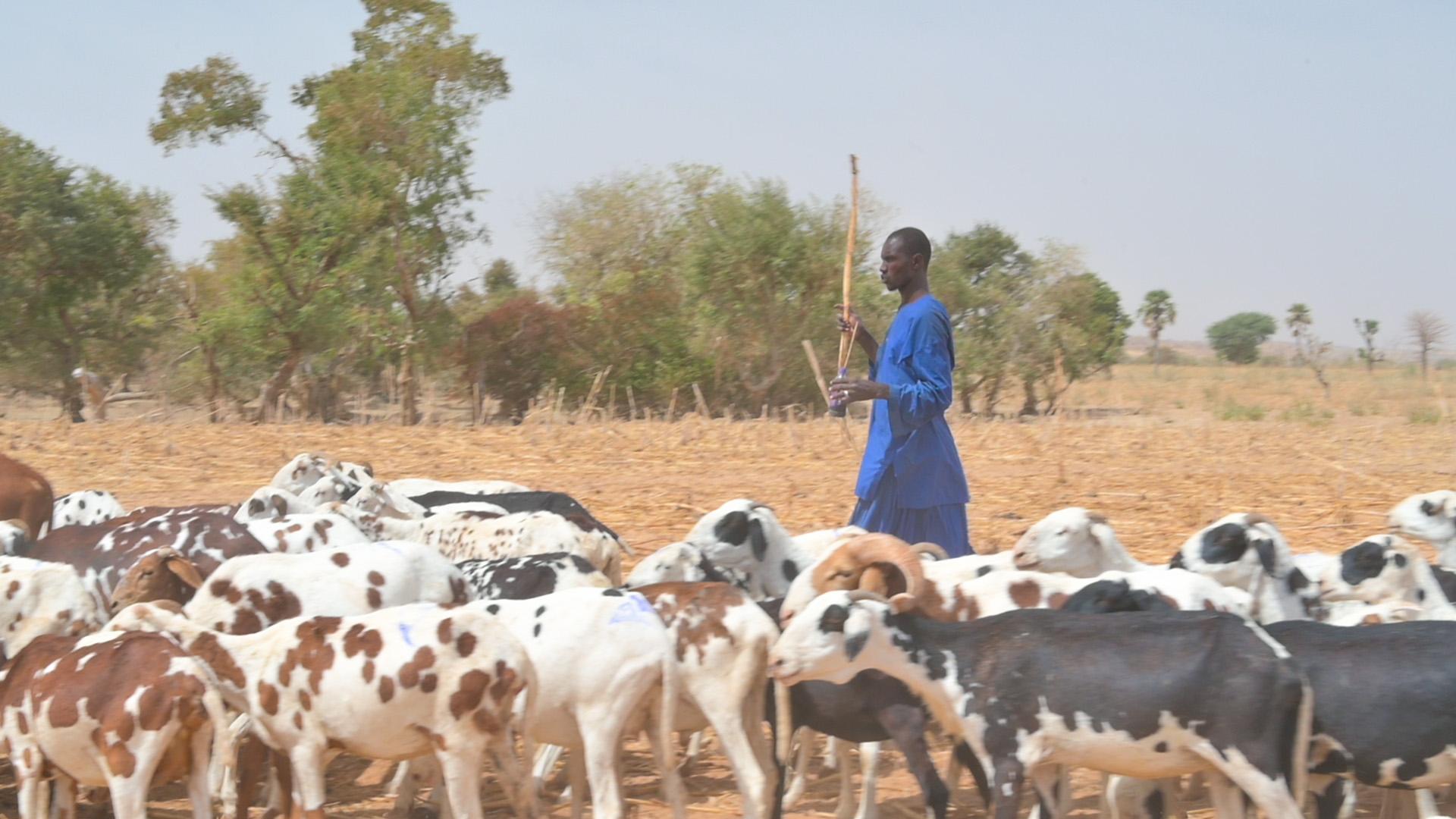
Au Mali, Enabel contribue à la sécurisation des périmètres pastoraux
Nènè TRAORE | 19/11/2020
Le cercle de Nara dans la région de Koulikoro est une zone pastorale par excellence.Il dispose d’atouts importants à même de soutenir les productions animales et de jouer un rôle majeur dans la sécurité alimentaire. Situé le long de la frontière avec la Mauritanie, le cercle dispose de vastes pâturages communautaires indemnes de toute occupation humaine autrefois.Depuis près d’une vingtaine d’années, le gouvernement du Mali appuyé par les partenaires techniques et financiers a initié la réalisation de vastes aménagements sous forme de périmètres pastoraux. Aujourd’hui, force est de constater la diminution de ces espaces aménagés au profit de l’agriculture. Des conflits persistent entre les agriculteurs et les éleveurs.Pour palier cette problématique, Enabel dans la mise en œuvre du projet AREPK (Appui au Renforcement de l’Elevage et à l’Economie Pastorale) a initié la sécurisation à travers le balisage et l’immatriculation de sept périmètres pastoraux pilotes afin de préserver ces espaces exclusivement réservés à l’élevage extensif.Dans le cercle de Nara, nous organisons régulièrement des séances de sensibilisation avec les autorités communales et coutumières bénéficiaires pour les informer du processus de sécurisation des périmètres pastoraux avant le début des travaux d'aménagement.
-
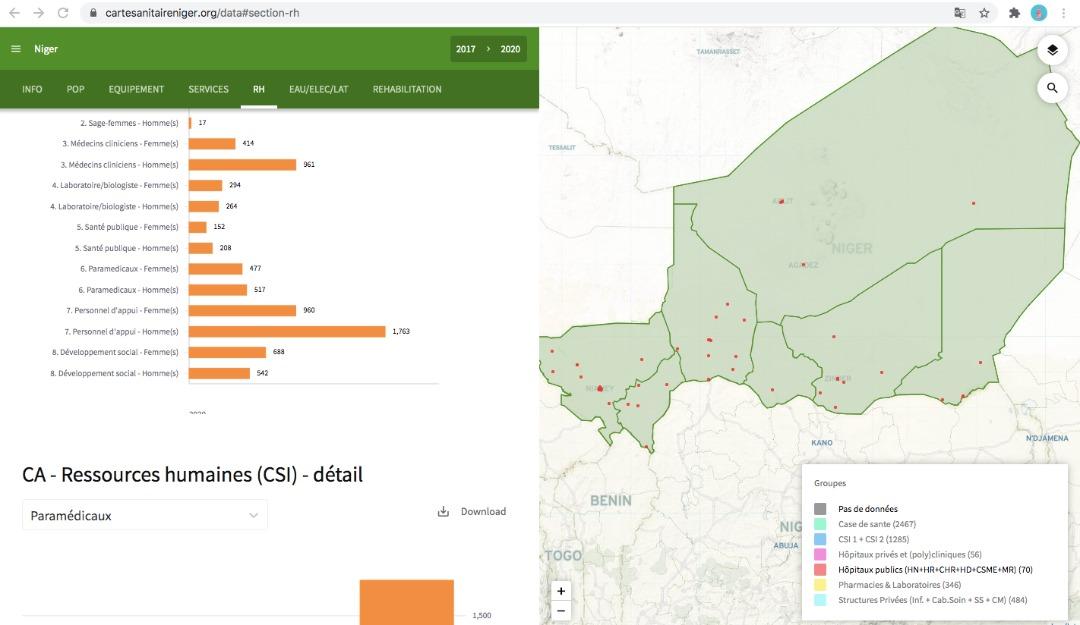
Présentation d'une carte sanitaire digitale du Niger
Halissa HASSAN DAN AZOUMI | 18/11/2020
Le 12 novembre 2020 à l’hôtel Bravia de Niamey s'est tenue la présentation de la carte sanitaire digitale du Niger. Cette carte représente l’aboutissement d’un long processus mené conjointement par Enabel à travers son projet d’appui au système de santé-PASS et la Direction des Statistiques du Ministère de la Santé Publique. Au cours des 10 dernières années, le Ministère de la Santé Publique a fréquemment investi dans des cartes sanitaires qui devenaient rapidement obsolètes ou ne donnaient pas satisfaction. Depuis 2018 le projet d’Enabel « Appui au Système de Santé-PASS » s’est mis à la disposition de la Direction des Statistiques du Ministère de la Santé Publique pour financer la mise en place d’une nouvelle carte sanitaire numérique accessible à tous. La carte sanitaire ainsi livrée, représente un nouveau départ, un autre processus doit démarrer avec la disponibilité de cet outil, pour améliorer la planification du développement sanitaire du Niger, car sa vocation est de permettre de façon simple, de générer les informations nécessaires pour la planification à tous les niveaux de la pyramide sanitaire.
